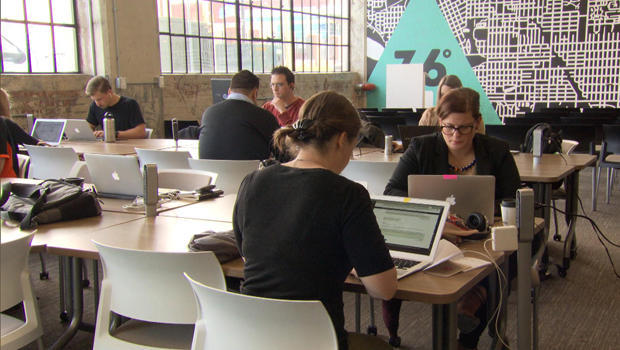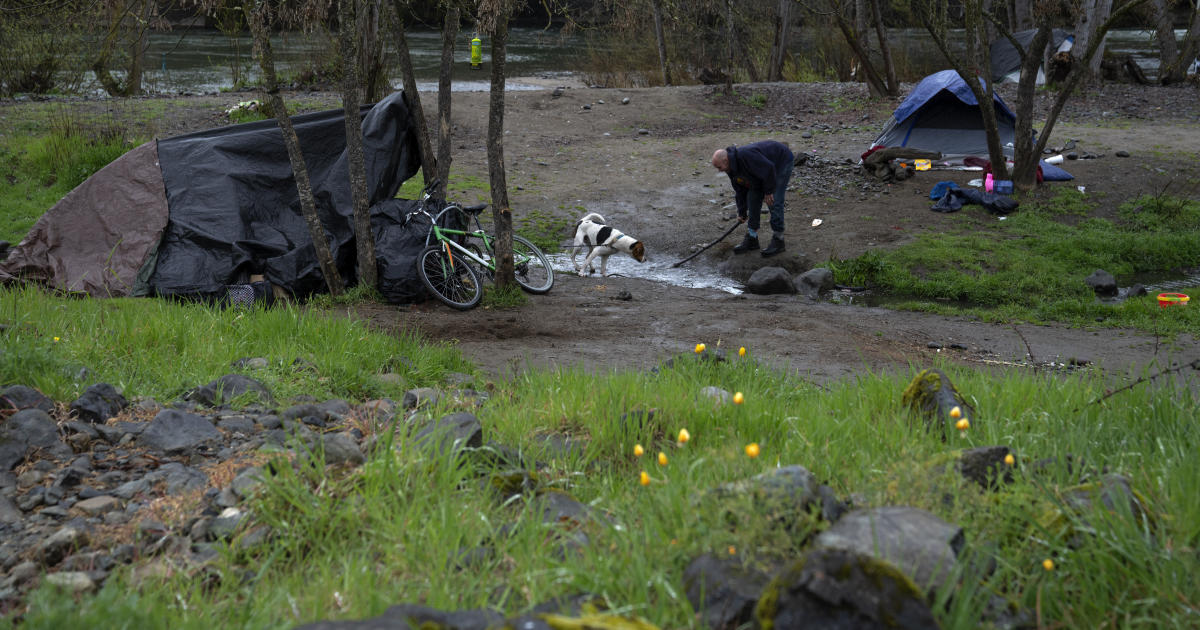Work remotely? Tulsa, Oklahoma wants you (and your laptop) to move
While packing up her small apartment in the middle of San Francisco, Stephanie Robesky has been pausing to drool over three-bedroom homes in the middle of the country. "I'm dying for a porch," she said.
Correspondent Conor Knighton asked, "Is there anything that you could buy in all of San Francisco for $200,000?"
"No. You couldn't even buy a parking space in San Francisco for $200,000!" Robesky laughed.
She should know; she works in property management, but she works "remotely," meaning she can mostly do her job from home – or really, from anywhere.
"And then did you start to think, 'Well, why am I working from one of the most expensive cities in the country?'" asked Knighton.
"Definitely!"
That's why Robesky made the decision to live in a "brand new state." Oklahoma! Land of oil, wide open prairie, and maybe a Route 66 sign or two, right?
Well, that's only part of the story. Tulsa, a city of 400,000, has plenty of hip coffee shops, bustling bars, and is home to a thriving arts district. It just doesn't get much credit for being cool. That's why last year a group in Tulsa created an ambitious program to spread the word to the growing population of workers around the country who are able to work remotely: Take your laptop to Tulsa, and they'll pay you $10,000 to move there.
"I think that going after remote workers allows us to identify really talented individuals who have the flexibility to work from wherever and show them what Tulsa has to offer them," said Aaron Bolzle, director of Tulsa Remote, a new initiative backed by the Tulsa-based non-profit George Kaiser Family Foundation. Its goal is to attract some new blood to Tulsa, with the hope that those who come might stick around.
In addition to the ten grand paid out over the course of a year, the program offers free communal office space and networking opportunities with other new arrivals.
Javier Ruiz, a writer for a language learning website who had been living in New York, was ready for a change of pace when he applied to the program. "It feels like it's time to calm down, to not be in the hustle-and-bustle," he said. "You get older and you think about what do you want to invest in for your future."
In Tulsa, Ruiz can easily afford a house. He's one of 100 remote workers who were accepted into the program's first year. There were more than 10,000 applicants who came from a wide array of industries. "Obviously, there's a large focus on technology," said Bolzle. "But health care was a huge area. We had a couple patent attorneys who applied who have the ability to work from wherever. We have a Harlem Globetrotter!"
Lili Thompson is one of the newest members of the Globetrotters. She was drafted right after college, and her new career is going to take her all over the world. "I can live anywhere, and fly in to the games whenever I'm needed," Thompson said. "And so, I had just the blank slate in front of me of where to go."
For Thompson, the $10,000 bonus was certainly a selling point, but she was also looking for a city where she could make a difference. "People move to Los Angeles all the time, and it's like a tiny drop in a puddle. But maybe with this Tulsa Remote program, myself and the other members of our cohort can come in and really have a big, positive impact on the city. That would be pretty cool!"
But in a city of 400,000, can 100 new recruits actually a make a difference? Tulsa Remote is spending over a million dollars betting they can.
Bolzle said, "I think that 100 people can make a difference, for sure. And I think that when those 100 people are so excited about making an impact and so ready to be part of a community and you have a community that's so ready to welcome them, that there is plenty of chance to have a huge impact."
Knighton asked Thompson, "When you told your friends that this was something you were thinking about doing, what was the reaction like?"
"They were like, 'Tulsa? Why you goin' to Tulsa?'" she laughed.
But if the program succeeds, Aaron Bolzle is hoping remote workers will soon be asking a different question: "The people that live here are incredibly gracious and welcoming. There's plenty of opportunity, there's space. Why not Tulsa?"
For more info:
- Tulsa Remote
- George Kaiser Family Foundation, Tulsa, Okla.
Story produced by David Rothman.




